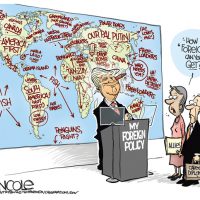-
Just say no to NAFTA
The North American Free Trade Agreement (NAFTA) is unpopular with many working people in the United States, who correctly blame it for encouraging capital flight, job losses, deindustrialization, and wage suppression.
-
Tax cuts: It’s all about capitalism
Powerful corporations and the rich in the United States continue their winning ways. By narrow margins, both the House of Representatives and Senate have agreed on a budget proposal that calls for an increase in the federal deficit of $1.5 trillion dollars in order to fund a major reform of the U.S. tax system that will make the rich and powerful even more so.
-
Challenging U.S. Foreign policy toward North Korea
It is an understatement to say that relations between the US and North Korea are very tense—the US government continues to threaten to further tighten economic sanctions on North Korea and launch a military attack to destroy the country’s missiles and nuclear weapons infrastructure. And the North for its part has said it would respond to any attack with its own strikes against US bases in the region and even the US itself.
-
The bipartisan militarization of the U.S. federal budget
The media likes to frame the limits of political struggle as between the Democratic and Republican parties, as if each side upholds a radically different political vision.
-
The sorry state of the US economy
Although reluctant to say it, a recent IMF report on the state of U.S. economy makes clear that U.S. policy makers have failed to protect majority living conditions. While the IMF generally pulls no punches in criticizing the policies of most member governments if it determines that they threaten to slow capitalist globalization dynamics, it tends to tap dance around disagreements when it comes to the policies of its more powerful member countries, especially the United States. If we want improved living conditions we are going to have to fight for them. Perhaps greater awareness of just how bad things are in the United States will help speed the effort.
-
Secular Stagnation
The fundamental changes I would advocate are those that would: dramatically boost worker power; secure a progressive and growing funding base for a needed expansion of public housing and infrastructure and public spending on health care, education, and transportation; and end the production and use of fossil fuels and significantly reduce greenhouse emissions.
-
Improving our quality of life will require rebuilding union strength
Unions provide workers with voice and the means to use their collective strength to gain job security and say over key aspects of their conditions of employment, including scheduling and safety. These gains are significant in our “employment at will” economy.
-
The need for a new U.S. foreign policy toward North Korea
USA-North Korean relations remain very tense even though the threat of a new Korean War has receded. Yet the U.S. government remains determined to tighten economic sanctions on North Korea and continues to plan for a military strike aimed at destroying the country’s nuclear infrastructure.
-
Monopolization and labor exploitation
Those who advocate “freeing the market” claim that doing so will encourage competition and thereby increase majority well-being. These advocates have certainly had their way shaping economic policies. And the results? According to several leading economists, the results include the growing monopolization of product markets and the steady decline in labour’s share of national income. Neither outcome desirable.
-
Lessons from a defeat in Europe
The Troika are celebrating the end of negotiations with Greece, proclaiming that thanks to their tireless efforts the Eurozone remains whole. And why wouldn’t they celebrate? They have demonstrated their power to crush, at least for now, the Greek effort to end austerity and its associated devastating social consequences. Tragically, Syriza has not only surrendered, […]
-
Just Say No to the U.S.-Korea Free Trade Agreement
The free trade push has begun again. Both U.S. President Barack Obama and South Korean President Lee Myung-bak are calling for ratification of the U.S.-Korea Free Trade Agreement, which was signed by the two countries’ trade representatives in April 2007 but has yet to be approved by either the U.S. Congress or the South […]
-
China, Capitalist Accumulation, and Labor
Most economists continue to celebrate China as one of the most successful developing countries in modern times. We, however, are highly critical of the Chinese growth experience. China’s growth has been driven by the intensified exploitation of the country’s farmers and workers, who have been systematically dispossessed through the break-up of the communes, the resultant collapse of health and education services, and massive state-enterprise layoffs, to name just the most important “reforms.” With resources increasingly being restructured in and by transnational corporations largely for the purpose of satisfying external market demands, China’s foreign-driven, export-led growth strategy has undermined the state’s capacity to plan and direct economic activity. Moreover, in a world of competitive struggle among countries for both foreign direct investment and export markets, China’s gains have been organically linked to development setbacks in other countries. Finally, China’s growth has become increasingly dependent not only on foreign capital but also on the unsustainable trade deficits of the United States. In short, the accumulation dynamics underlying China’s growth are generating serious national and international imbalances that are bound to require correction at considerable social cost for working people in China and the rest of the world
-
Another World Is Indeed Possible
For some time, business and government leaders in the United States have aggressively promoted policies designed to expand opportunities for private profit making. The result has been growing instabilities and inequalities. Many opposed to this development have called for the imposition of controls on private production, investment, and price decisions. However, those in power routinely […]
-
South Korea: The State of Political Struggle
The post-crisis trajectory of the South Korean economy has been a disaster for working people there, and South Korean labor and left movements are engaged in a very difficult struggle to roll back the ongoing neoliberal restructuring. In this essay I discuss some of the challenges these movements face. I do so because workers and […]
-
South Korea: The Unraveling of an Economy
South Korea, the poster country for the IMF in the post-East Asian crisis period, is in serious economic trouble. That’s probably why you hear so little about what is happening there. After a major economic collapse in 1998, the country recorded GDP growth rates of 10.9 percent and 9.3 percent in 1999 and 2000, respectively. […]









